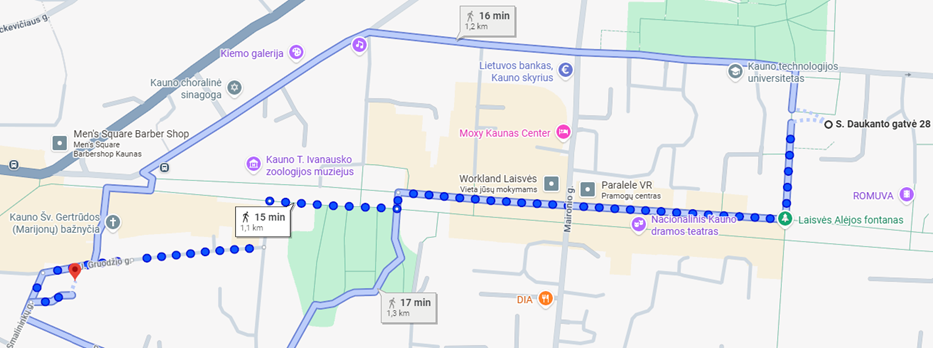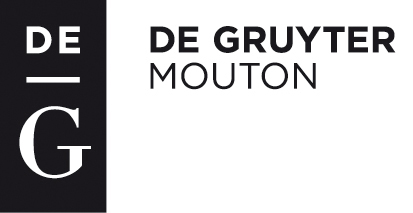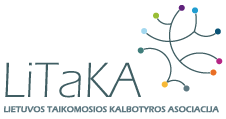

ABOUT US
THE 5th ILLA FOCUS CONFERENCE ON FORENSIC LINGUISTICS
Title: Language as evidence
Date: 2 September 2025
THE 7TH GENERAL ILLA CONFERENCE
Title: Language and Law in an Age of Uncertainty and Transition
Date: 3-5 September 2025
Hosted by The Faculty of Humanities and the Faculty of Law, Vytautas Magnus University
We are delighted to announce the 7th ILLA General Conference to be held at Vytautas Magnus University in Kaunas. The upcoming edition of the conference focuses on the uncertainties of the 21st century, which greatly impact different areas in present-day societies, including linguistic behaviours and law practices. This conference thus invites scholars, legal practitioners, policymakers, and other professionals from different areas to share their research on language and law by relating it to the context of transition and uncertainty.
As in the previous conferences, this General Conference will be preceded by another event – the 5th ILLA Focus Conference on Forensic Linguistics (2 September 2021) to be held at the same location.
Language of the conferences: English
Format of the conferences: In-person plenaries and 20-minute presentations in thematic panels
Organised in cooperation with The International Language and Law Association (ILLA)
PHOTO ALBUM

CONFERENCE CHAIR
Prof. Dr. Jūratė Ruzaitė, Vytautas Magnus University (Contact: jurate.ruzaite@vdu.lt)
LOCAL ORGANISING COMMITTEE
Prof. Dr. Julija Kiršienė, Vice-Rector for Research, Professor at the Department of Private Law, Vytautas Magnus University; ORCID: 0000-0003-2196-5648
Prof. Dr. Aurelija Leonavičienė, Head of the Department of Foreign Language, Literary and Translation Studies, Faculty of Humanities, Vytautas Magnus University; ORCID: 0000-0001-8289-8333
Assoc. Prof. Dr. Darius Amilevičius, Vice-President of the Institute of Digital Resources and Interdisciplinary Research (SITTI), Senior Researcher at SITTI, Vytautas Magnus University; ORCID: 0000-0001-7255-2734
Assoc. Prof. Dr. Vilma Bijeikienė, Vice-Rector for Communication, Associate Professor at the Institute of Foreign Languages, Vytautas Magnus University; ORCID: 0000-0003-0807-4322
Assoc. Prof. Dr. Saulė Milčiuvienė, Department of Private Law, Faculty of Law, Vytautas Magnus University; Head of the project Transform4ERI; ORCID: 0000-0002-8253-9522
LOCAL SUPPORT GROUP
Assoc. Prof. Dr. Rūta Eidukevičienė, Dean of the Faculty of Humanities, Vytautas Magnus University; ORCID: 0000-0002-5807-6804
Prof. Dr. Auksė Balčytienė, Department of Public Communications, Faculty of Political Science and Diplomacy, Vytautas Magnus University; UNESCO Co-Chair on Media and Information Literacy for Knowledge Inclusive Societies; Head of the DIGIRES association (https://digires.lt/en/); ORCID: 0000-0003-3358-7912
Prof. Dr. Rūta Petrauskaitė, President of the Institute of Digital Resources and Interdisciplinary Research (SITTI), professor at the Department of Lithuanian Studies, Vytautas Magnus University; ORCID: 0000-0002-6948-3202
Dr. Jurgita Macijauskaitė-Bonda, Vice-Dean of the Faculty of Humanities, lecturer at the Department of Foreign Language, Literary and Translation Studies, Faculty of Humanities, Vytautas Magnus University; https://hdl.handle.net/20.500.12259/154416
Dr. Teresė Ringailienė, Director of the Foreign Language Institute, Vytautas Magnus University; ORCID: 0000-0002-1082-9096
EXTERNAL COLLABORATORS
CONFERENCES

THE 7TH GENERAL ILLA CONFERENCE

5th ILLA FOCUS CONFERENCE ON FORENSIC LINGUISTICS
CULTURE
September 3 (Wednesday)
20.00 Welcome Reception: Season Transition and A Farewell to Summer
Join us for a Welcome Reception on the outdoor terrace of Restaurant Sala*, located on Nemunas Island, offering a scenic view of the Nemunas River.
Address: Karaliaus Mindaugo pr. 50
Cultural Highlight: Sunset Over the River
Experience the beauty of the sunset over the Nemunas, expected at approximately 8:13 PM—though nature may have other plans. With weather ranging from rainy and overcast to sunny and warm, we invite you to embrace the Lithuanian way of uncertainty and the transitioning seasons!
*sala in English means “island.” It is a countable, feminine-gender noun in the singular form and belongs to the 1st declension, which determines how the word changes across the seven cases in both singular and plural. See you at the event to learn more! 😊
September 4 (Thursday)
19.00 Conference Dinner
Restaurant and beer brewery AVILYS*, located in Kaunas Old Town, in the cellars of the 18th century
Address: Vilniaus g. 34 (t.b.c.)
*avilys in English means “bee hive“
September 5
15.00-17.00 City Tour
(Meeting point – Entrance of V. Putvinskio 23)
CONTACT
Jūratė Ruzaitė: jurate.ruzaite@vdu.lt
KEYNOTES
Auksė Balčytienė
(Vytautas Magnus University)
Resisting uncertainty: Laying the ground for dialogue in the times of digital expressionism
Auksė Balčytienė is a core founding person of the Journalism and Communications School at VMU (since 1998). Her main scholarly interests are in digital transformations and democratization, agency and citizenship, media policy and communication rights, media literacy, media cultures and European Public Sphere. Auksė is highly interested in diverse topics related to media’s role in social/cultural changes; she has published widely on trends and effects of liberalization, democratization, Europeanization, and platformization. She is passionate about media infused social changes, and her most recent object of research and public speaking is democratic forms of public resilience against the so-called information disorders (disinformation, strategic manipulations, instigations to conflict, fake narratives, etc.). She acts as external reviewer at the ERC, as well as at the Baltic research foundations.
Eleonora Esposito
(University of Navarra)
Combating Technology-Facilitated Gender-Based Violence: Why Knowing is Half the Battle
Eleonora Esposito is a Seconded National Expert at the European Institute for Gender Equality (EIGE) and a Researcher at the Institute for Culture and Society (ICS) of the University of Navarra (Spain). A Marie Skłodowska-Curie Alumna (2019-2021), Dr. Esposito has been investigating cyber violence against women in politics as a deepening challenge to gender equality and democracy. At EIGE, she is a Researcher in the Gender-based Violence Team and the Project Manager of “Cyber violence against women and girls in the EU 27”.
Christoph A. Hafner & Rodney H. Jones
(City University of Hong Kong)& (University of Reading(UK))
Generative AI and the Future of Legal Education
Christoph A. Hafner (City University of Hong Kong)
Christoph Hafner’s principal research interests include English language teaching and learning, legal English and digital literacies. In particular, he is interested in studying how new technologies can be utilised to support the development of both ‘traditional’ domain-specific literacies (e.g. English for Law), and the ‘digital literacies’ which are necessary to exploit the potential of digital media. He has co-authored a book (with Rodney H. Jones) entitled Understanding Digital Literacies: A practical introduction (Routledge, 2012).
He is principal investigator in an ongoing action research project, which investigates academic literacy in the Hong Kong context (project website here). Most recently, this project has examined university students’ use of digital video to create multimedia scientific documentaries in the context of a course in English for Science. He currently teaches courses in English for Specific Purposes, Writing for New Media and Language in Law and Crime.
Rodney H. Jones (University of Reading (UK)
Rodney H. Jones is Professor of Sociolinguistics and Head of the Department of English Language and Applied Linguistics at the University of Reading. He has published widely in the areas of digital literacies, mediated discourse analysis, and language and creativity. His main areas of interest are discourse analysis, interactional sociolinguistics, and language and digital media. He is particularly interested in how digital media affect the way people conduct social interactions and manage social identities.
He has authored or edited fifteen books and over one hundred journal articles and book chapters. Some of his recent books include Health and Risk Communication: An Applied Linguistic Perspective (Routledge, 2013), The Routledge Handbook of Language and Creativity (2015), Spoken Discourse (Bloomsbury, 2016), Language and Media: A Resource Book for Students, 2nd edition (with Sylvia Jaworska and Erhan Aslan, Routledge 2020), Understanding Digital Literacies: A Practical Introduction, 2nd edition (with Christoph A. Hafner, Routledge 2021), and Discourse Analysis, 3rd edition (Routledge 2024). He is also editor of The Routledge Handbook of Language and Creativity (2015).
In March 2022 he was made a Fellow of the Academy of Social Sciences.
Ralf Poscher
(Max Planck Institute for the Study of Crime, Security and Law)
The Telos in and of Legal Hermeneutics
Legal scholar Ralf Poscher is a director at the Max Planck Institute for the Study of Crime, Security and Law (formerly Max Planck Institute for Foreign and International Criminal Law). At the Freiburg Institute he is setting up a Department of Public Law. Ralf Poscher has been a professor at the Law Faculty of the University of Freiburg since 2009. He has held the position of dean of the Faculty of Law since 2018. From 2013 to 2018, he was managing director of the Centre for Security and Society (CSS) at the University of Freiburg. He previously held a professorship at the Law Faculty of the Ruhr University Bochum. Earlier stations in his academic career include the Institute for Advanced Study, Princeton, USA, the Faculty of Law of the University of Osaka, Japan, and the Humboldt University in Berlin.
Rosanna Sornicola
(University of Naples Federico II)
“In hoc tempore barbarico”. Language and Law in the Crisis of the Roman World
Rosanna Sornicola is a Professor of General Linguistics and Director of the European Master’s Degree in Linguistics at the University of Naples “Federico II”. She graduated in Linguistics and Modern Philology from the same university in 1975. She has held visiting positions at institutions including Wolfson College (Cambridge) and the University of California (Berkeley and Los Angeles). Prof. Sornicola has participated in major international research projects and collaborates on Italian sociolinguistics and dialectology with the Universities of Turin and Heidelberg. She is a member of various linguistic journal boards and has served as President of the Società di Linguistica Italiana since 1999. Her research focuses on spoken language, sociolinguistics, and the history of linguistics.
Ralf Poscher
REGISTRATION
REGISTRATION FORM
IMPORTANT DATES
- 15 September 2024 – Call for papers
- 15 November 2024 – 2nd Call for papers
- 1 February 2025 – Deadline for submission of abstracts
- 1 March 2025 – Notification of acceptance/rejection
15 August 202530 June 2025 – End of registration- Early bird registration deadline: 15 May 2025
- Regular registration deadline:
15 August 202530 June 2025
REGISTRATION FEES
- Academics and professionals
- Early bird: by 15 May 2025 (Friday)
- Basic: 200 eur (for ILLA members: 140)
- Full: 260 eur (for ILLA members: 200)
- Regular: by 15 August 2025 (Friday)
- Basic: 270 eur (for ILLA members: 210)
- Full: 330 eur (for ILLA members: 270)
- Early bird: by 15 May 2025 (Friday)
- Students
- Early bird: by 15 May 2025 (Friday)
- Basic: 100 eur
- Full: 130 eur
- Regular: by 15 August 2025 (Friday)
- Basic: 140 eur
- Full: 170 eur
- Early bird: by 15 May 2025 (Friday)
- The basic fee includes participation in lectures, conference materials, ID badge, coffee breaks and lunches.
- The full fee includes participation in lectures, conference materials, ID badge, coffee breaks, lunches, welcome reception, conference dinner and the cultural programme.
PAYMENT DETAILS
Early bird registration deadline: 15 May 2025
Regular registration deadline: 15 August 2025
Fees include both the 5th ILLA Focus Conference on Forensic Linguistics (2 September 2025) and the 7th ILLA General Conference (3-5 September 2025).
Bank account:
IBAN: ES09 2100 4433 3902 0016 8766
BIC/SWIFT: CAIXESBBXXX
DEPARTAMENTO DE FILOLOGÍA INGLESA – FACULTAD DE FILOSOFÍA Y LETRAS –
CAMPUS DE
SAN VICENTE DEL RASPEIG S/N, C.P. 03690, ALICANTE/ALACANT (SPAIN)
The fee must be transferred in euros only.
VENUE
Link to the interactive map: https://www.vdu.lt/en/contacts/vmu-map/
Venue – Number 3 | S. Daukanto 28) | Vytautas Magnus University

Hotel “Santaka” | J. Gruodžio St. 21

VYTAUTAS MAGNUS UNIVERSITY IN KAUNAS (VMU)
Vytautas Magnus University was established in 1922 and re-established in 1989. It is a classical university based on the common beliefs and values of freedom, openness, and dialogue, and orientated towards humanistic culture. The University provides degree studies of all three cycles – bachelor, master and PhD studies, which cover a broad spectrum of fields ranging from humanities, social sciences and arts to the fundamental sciences, environmental sciences, and biotechnologies. The University’s Liberal Arts education profile, with core emphasis on studying broadly themed subjects, ensures that the studies offered at VMU are comprehensive and are not restricted to specialized, pre-defined subjects.
Videos about the university: https://www.youtube.com/watch?v=MTtfSRozWKY; https://www.youtube.com/watch?v=IAlt2SRa254
University website: https://www.vdu.lt/en/about-vmu/
The university is located in the city of Kaunas, Lithuania’s temporary capital city during the Interwar period.
PRACTICAL INFORMATION
Kaunas, the second largest city in Lithuania, is located at the confluence of the two largest Lithuanian rivers. It was first mentioned in written sources in 1361, but the settlement had been established considerably earlier. It is not only a city of old traditions and a large centre of business and industry, but also a city of culture. While the titular year of Kaunas European Capital of Culture 2022 is over, Kaunas remains full of cultural events, opportunities, and adventures. The city is famous for its Interwar architecture, which was awarded the European Heritage label and is on its way to UNESCO. Kaunas is the only city in the world where so much of the style of the buildings has survived to the present day.
THINGS TO DO IN KAUNAS
Visit Kaunas: https://visit.kaunas.lt/en/
Video about Kaunas: https://visit.kaunas.lt/assets/year-kaunastic-60-sec-1.mp4
TRAVELLING TO KAUNAS
General info: https://visit.kaunas.lt/en/plan/transport/arrival-to-kaunas/
✈️ Travel Information: Vilnius – Kaunas
From Vilnius Airport to the City Centre
Both the train station and the bus station are located in the city centre, just across the street from each other. Public transport options:
🔗 Vilnius Airport – Public Transport
🚖 Taxi / Bolt
The quickest and easiest option is a Bolt or regular taxi. The distance is short (just a few kilometres), so the price should be reasonable. More info on regular taxis:
🔗 Vilnius Airport – Taxi Info
🚆 Train: Vilnius – Kaunas
Check schedules and buy tickets here:
🔗 Train Tickets
Tickets can also be purchased on the train for an extra charge. Tip: Choose Class 1 (Klasė 1) — you’ll get an assigned seat in the silent carriage (Carriage 1, upper level).
🚌 Bus: Vilnius – Kaunas
Schedules and tickets available here:
🔗 Bus Tickets
Tickets can be purchased on the bus or at the bus station terminal.
🌐 More Details
More travel information is also available on the conference webpage:
🔗 Conference Travel Info
RECOMMENDED HOTELS
Moxy Kaunas Center***
🏴 Maironio g. 19, Kaunas
From €70
🔗 https://www.marriott.com/hotels/travel/kunox-moxy-kaunas/
Radisson Hotel Kaunas****
🏴K. Donelaičio g. 27, Kaunas
🔗 https://www.radissonhotels.com/en-us/hotels/radisson-kaunas
From €70
BEST BALTIC Kaunas
🏴A.Mickeviciaus g. 28, LT-44311 Kaunas,
🔗 http://www.bestbaltichotels.eu/
From €74
Best Western “Santaka”****
🏴J. Gruodzio g. 21, Kaunas
From €90
Hotel “Kaunas” ****
🏴Laisves Al. 79, LT-44297 Kaunas
From €120
HOF HOTEL****
🏴Maironio g. 21A, LT-44250 Kaunas
From €140
For additional suggestions, please click here: https://www.visit.kaunas.lt/en/plan/accommodation/hotels/


